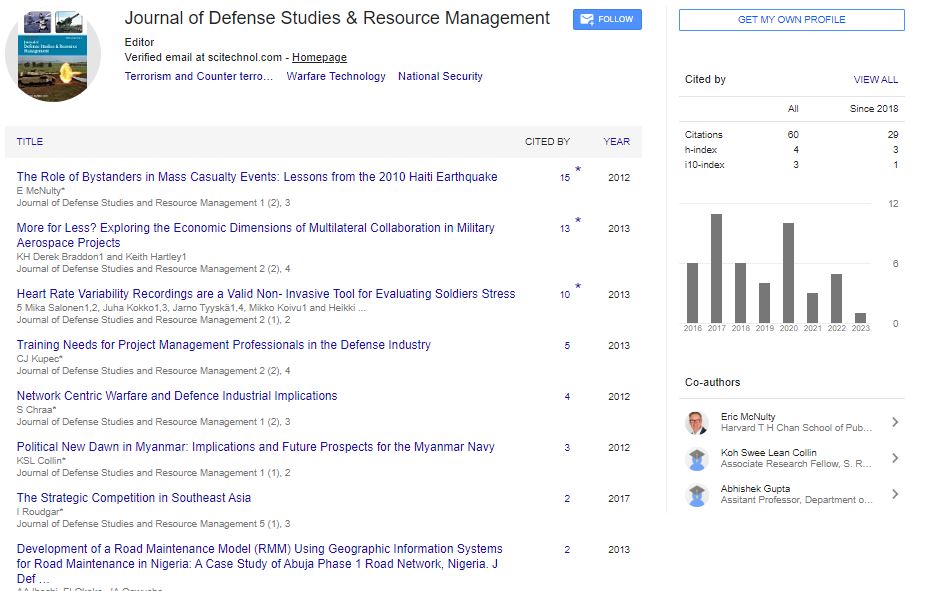Perspective, J Def Stud Resour Manage Vol: 11 Issue: 2
Intelligence, Defense, and Global Engagement: Decoding Britain's Security Studies
Daniel Edwards*
1Department of international management, ESCP Business School, London, United Kingdom
*Corresponding Author: Daniel Edwards,
Department of international
management, ESCP Business School, London, United Kingdom
E-mail: Daniedward47@ escp.eu
Received date: 29 May, 2023, Manuscript No. JDSRM-23-107150;
Editor assigned date: 31 May, 2023, PreQC No. JDSRM-23-107150 (PQ);
Reviewed date: 15 June, 2023, QC No. JDSRM-23-107150;
Revised date: 22 June, 2023, Manuscript No. JDSRM-23-107150 (R);
Published date: 29 June, 2023, DOI: 10.4172/2324-9315.1000176
Citation: Edwards D (2023) Intelligence, Defense, and Global Engagement: Decoding Britain's Security Studies. J Def Stud Resour Manage 11:2.
Abstract
Description
Britain's security studies reflect its historical legacy as a global power and its enduring commitment to ensuring national and international security. This article delves into Britain's security studies, examining the nation's historical context, security challenges, defense policy, military capabilities, intelligence apparatus, and its role in global security affairs. By analyzing Britain's security studies, we gain insights into the nation's approach to safeguarding its interests, contributing to international security, and addressing evolving security threats in a complex global landscape.
Historical context
Britain's security studies are deeply intertwined with its historical experiences as a global power. From colonial engagements to two World Wars, Britain's historical context shaped its security outlook. The nation's imperial past and subsequent decolonization efforts have influenced its strategic thinking and international engagement.
Security challenges
Britain faces a range of security challenges, including terrorism, cyber threats, organized crime, and hybrid warfare. The threat of international terrorism remains a significant concern, and Britain has witnessed several high-profile terrorist attacks. Cybersecurity is another growing challenge, as the nation's critical infrastructure and information networks are vulnerable to cyber threats.
Defense policy and military capabilities
Britain's defense policy centers on maintaining a capable and flexible military force that can adapt to evolving threats. The British Armed Forces comprise the British Army, Royal Navy, and Royal Air Force, supported by reserve forces. The military capabilities of Britain include advanced naval assets, such as aircraft carriers and nuclearpowered submarines, an expeditionary land force, and a modern air force with advanced fighter aircraft.
Intelligence apparatus
Britain's intelligence apparatus is a cornerstone of its security studies, providing critical intelligence gathering, analysis, and counter intelligence capabilities. The Secret Intelligence Service, commonly known as MI6, operates both domestically and internationally, focusing on foreign intelligence and espionage activities. MI6 plays a crucial role in collecting information on potential threats to British national security, supporting policy-making, and conducting covert operations to protect British interests abroad.
The Security Service, or MI5, is responsible for domestic security, counterterrorism, and counterintelligence operations within the United Kingdom. MI5's primary objective is to identify and mitigate threats posed by terrorist organizations, espionage activities, and subversive elements. It works closely with law enforcement agencies and international partners to gather intelligence, investigate threats, and safeguard national security.
The Government Communications Headquarters (GCHQ) is the UK's intelligence agency responsible for signals intelligence and cyber defense. GCHQ intercepts and analyses electronic communications, providing critical insights into potential security threats, cyberattacks, and foreign intelligence operations. It also plays a significant role in ensuring the security of the nation's communications infrastructure and developing capabilities to defend against cyber threats. In addition to these agencies, Britain's intelligence community also includes the Defence Intelligence, which provides intelligence support to the military, and the Joint Terrorism Analysis Centre (JTAC), which assesses the threat level from terrorism and coordinates counterterrorism efforts.
The cooperation between British intelligence agencies and international partners is vital for addressing global security challenges. The "Five Eyes" intelligence alliance, comprising the United States, Canada, Australia, New Zealand, and the United Kingdom, facilitates close collaboration in sharing intelligence, conducting joint operations, and countering shared threats. The intelligence apparatus in Britain operates under a legal framework that ensures accountability, oversight, and protection of civil liberties. The agencies operate within the boundaries set by legislation, such as the Intelligence Services Act and the Regulation of Investigatory Powers Act, which provide guidance on their activities and balance security with individual rights and privacy.
International security contributions
Britain actively contributes to international security through various avenues. As a key member of NATO, it participates in collective defense efforts and contributes forces to alliance operations. Britain's armed forces are engaged in peacekeeping missions around the world, supporting stability and conflict resolution efforts. The nation also collaborates closely with international partners, including the "Five Eyes" intelligence alliance (comprising the United States, Canada, Australia, and New Zealand) and European security and defense.
Conclusion
Britain's security studies reflect its historical context, global engagement, and commitment to safeguarding national and international security. By analyzing Britain's security challenges, defense policy, military capabilities, and intelligence apparatus, we gain a deeper understanding of the nation's approach to addressing initiatives. evolving threats. As a leading global power, Britain's role in international security affairs and its contributions to collective security efforts remain significant. By continuing to adapt to emerging challenges, maintain strong defense capabilities, and collaborate with international partners, Britain aims to secure its interests, promote stability, and contribute to global security in an ever-changing world.
 Spanish
Spanish  Chinese
Chinese  Russian
Russian  German
German  French
French  Japanese
Japanese  Portuguese
Portuguese  Hindi
Hindi 